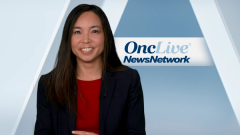
AML Update: Incidence, Risk Factors, and Prognosis
Join Catherine Lai, MD, MPH in this informative OncLive News Network program as she explores strategies for optimizing outcomes in the long-term management of Acute Myeloid Leukemia (AML), with a focus on patients in first remission without a transplant. Here, she provides a brief overview of the current incidence of AML, its risk factors, and prognosis.
Episodes in this series

This is a synopsis of an Insights series featuring Catherine E. Lai, MD, MPH, of the University of Pennsylvania.
Dr. Catherine E. Lai discussed insights into the long-term treatment of acute myeloid leukemia (AML), particularly for patients in first remission who do not receive a transplant, including highlights from the 2023 ASH Annual Meeting. She noted that unlike other cancers, AML is an uncommon cancer with an incidence in the United States of a little over 20,000 newly diagnosed cases per year. However, the mortality rate is significantly higher with a 5-year overall survival ranging from 25% to 50% depending on the molecular subtype. Regarding risk factors, the cause of most AMLs is unknown; however, there are risk factors that affect a patient's ability to withstand treatment, typically related to the patient's physiologic age or fitness. This is challenging to measure as external appearance and comorbidities differ from true physiologic age. Both age and comorbidities are considered when determining treatment options. Prognosis is also impacted by molecular subtype at diagnosis. Dr. Lai went on to discuss data presented at the 2023 ASH Annual Meeting related to optimizing outcomes for AML patients in first remission who do not receive a transplant. She provided insights into current and emerging treatment approaches for this patient population.
*Video synopsis is AI-generated and reviewed by OncLive editorial staff.





































